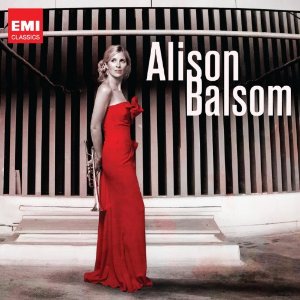“A vehicle of expression” is how Alison Balsom describes the trumpet after its technical and physical demands have been mastered and the instrument’s potential can be fully realized. And as you listen to her play, almost no matter what the repertoire, “expressive” is a word that comes to mind, along with “lyrical”, “warm”, “articulate”, “seductive”—words easily and often associated with the human voice; and indeed, Balsom regards the trumpet as a voice, of many colors, one that “sings” rather than brashly, brassily asserts itself (although she certainly can bring out that more common side of the trumpet’s personality when she wants or needs to).
This is a compilation drawn from several recordings from the past 10 years, and it’s an intelligently designed program that not only shows Balsom’s versatility and virtuosity, but flows well from piece to piece, sparing us the sudden, jarring juxtapositions of incompatible styles or acoustics we often experience on such collections. From Piazzolla’s Esqualo and Libertango and movements from a Marcello oboe concerto, Bach’s Trio sonata in C major (a very agreeable partnership of trumpet, gamba, and harpsichord), Neruda’s Trumpet concerto in E-flat, and Macmillan’s Seraph for trumpet and string orchestra, we’re led through a wide range of styles and works both originally for trumpet and transcribed for it. Among the latter are Rachmaninov’s Vocalise (which seems to adapt well to whatever instrument it’s arranged for), Debussy’s Syrinx (which Balsom plays in its original flute key), and two songs: a lovely arrangement by Balsom and her pianist, Tom Poster, of “Nobody Knows”, and even more beautiful, her version of “Shenandoah”, accompanied only by organ, as movingly played and “sung” as the sweetest church hymn. This collection is an ideal way to get to know Balsom’s work–and yes, even if you have reservations about an entire disc of trumpet music (and I’m with you on that!), don’t be afraid: this is a pleasure from beginning to end.
































